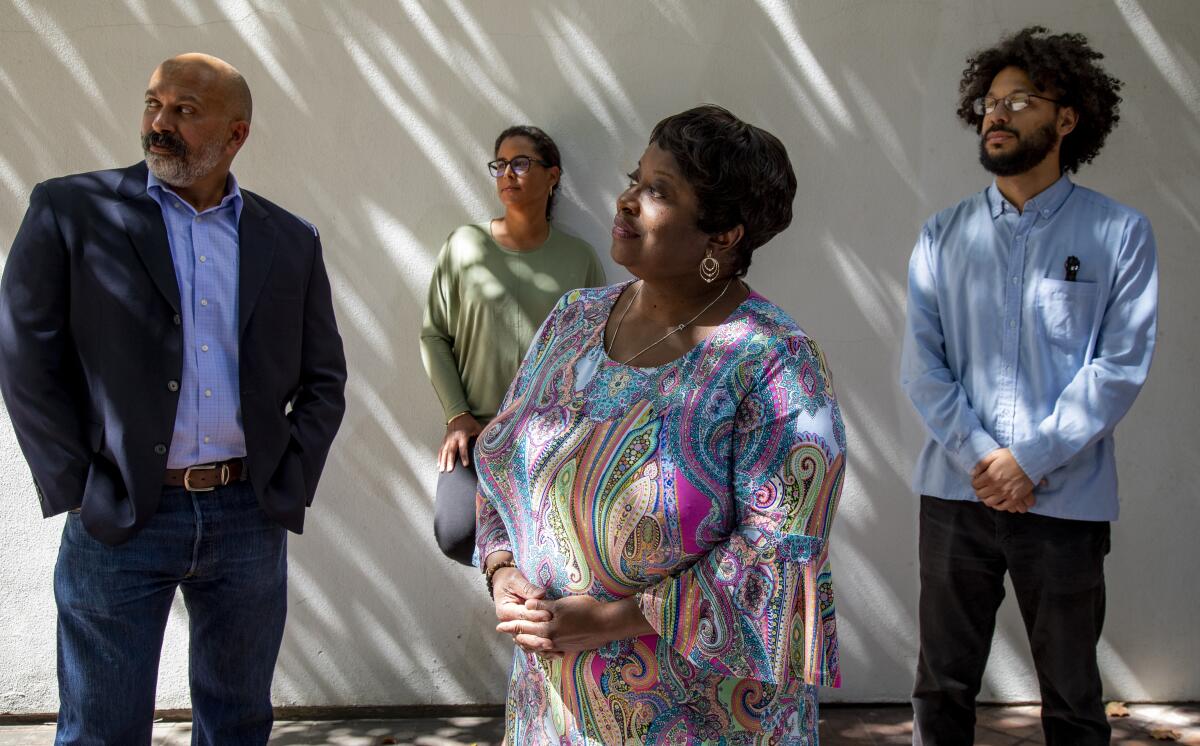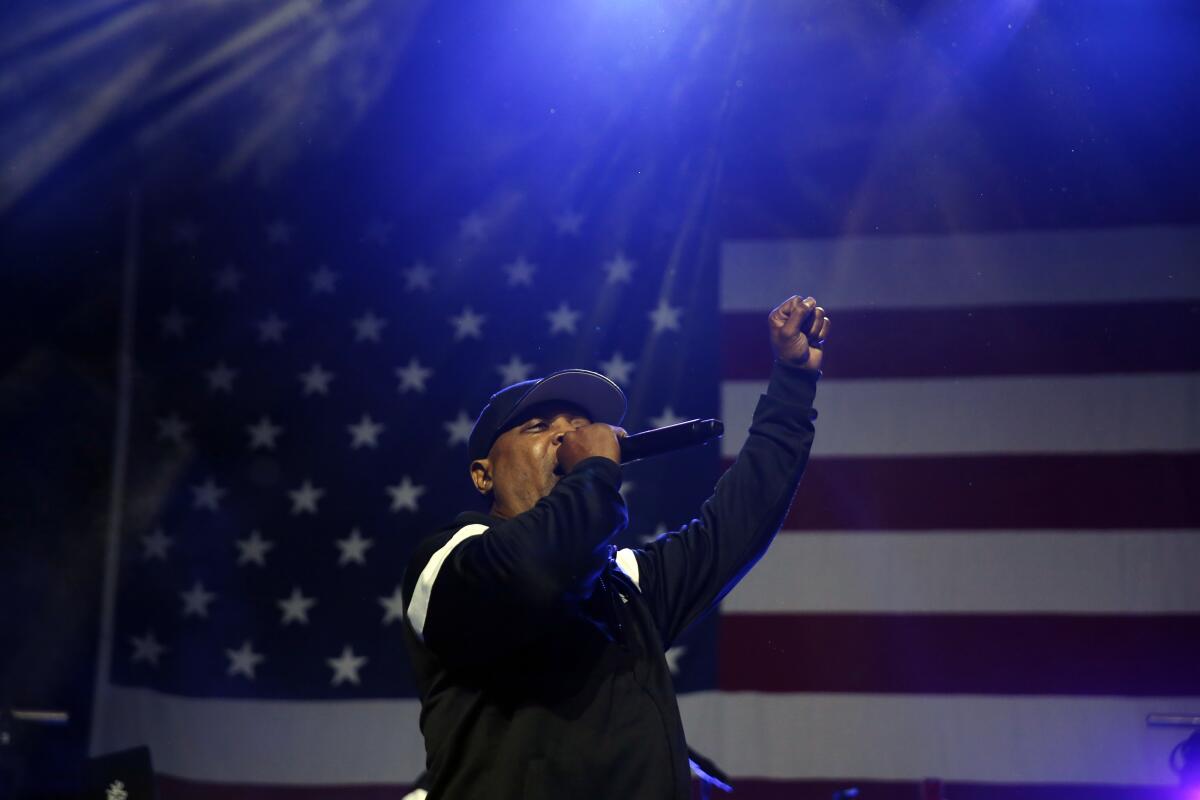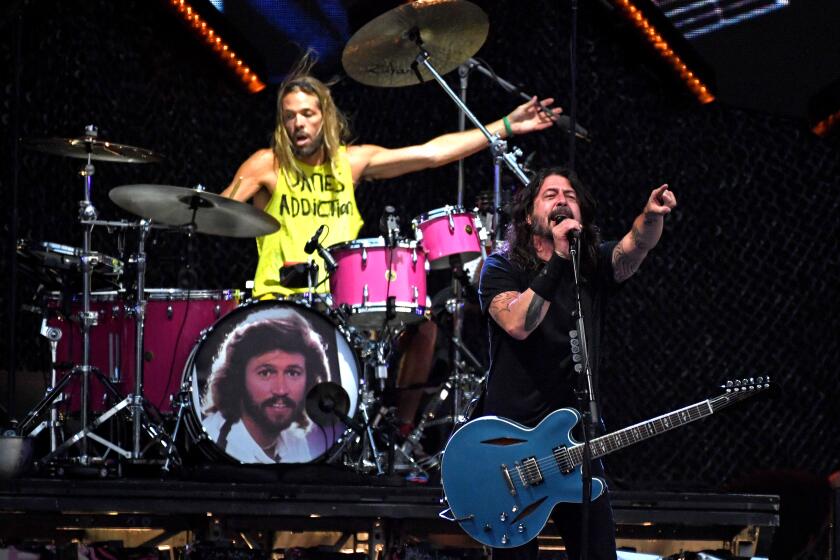UCLA announces ambitious ‘Hip Hop Initiative’ with Chuck D as artist in residence

- Share via
Two years ago at the California African American Museum in downtown Los Angeles, three titans of East Coast rap converged for a roundtable: influential “Paid in Full” rapper Rakim; Public Enemy’s cofounder Chuck D; and indie rap royalty Talib Kweli.
Called “Sweat the Technique: The Politics and Poetics of Hip-Hop,” the event attracted a standing-room-only crowd in South Los Angeles. Little did they know that the roundtable — which was supposed to be the first in a months-long L.A. Phil series called Power to the People! — would lay the groundwork for UCLA’s just-announced Hip Hop Initiative, or that Chuck D would serve as its inaugural artist in residence.
“The room was sweating. It was on fire,” recalls says H. Samy Alim, UCLA professor of anthropology and director of the university’s new initiative. He said the event set the template for “what we can do when we all come together to showcase hip-hop’s power and strength.”
Touting itself as “the leading center for Hip Hop Studies globally,” the initiative aims to amplify and multiply the conversation on hip-hop culture across artistic disciplines “by way of artist residencies, community engagement programs, a book series, lecture series, an oral history and digital archive project, postdoctoral fellowships and more,” according to the initiative’s announcement.
The initiative will expand the Hip Hop Studies Series of books published by University of California Press and edited by Alim and Jeff Chang, best known for his essential book on rap, “Can’t Stop Won’t Stop: A History of the Hip-Hop Generation.” It will also build on the university’s decades-in-the-making archive, accelerating the researching and documentation of hip-hop in the Los Angeles area.
UCLA has long forged paths in the scholarship of American music. Alumni of its famed school of music include Kamasi Washington, Randy Newman, Carol Burnett, John Fahey and La Monte Young, and its faculty has included Herbie Hancock, Kenny Burrell, Patrice Rushen and the late Barbara Morrison, among many others.
Taylor Hawkins, who died Friday at age 50, gave the Foo Fighters’ earnest anthems a palpable sense of fun, swagger and sex appeal.
Alim describes the 2020 “Sweat the Technique” roundtable — produced by the Los Angeles Philharmonic with support from the California African American Museum and UCLA’s Ralph J. Bunche Center for African American Studies — as indicative of the Hip Hop Initiative’s mission.
Noting that it’s been a half-century since Bronx disc jockey Kool Herc planted the seeds of hip-hop, Alim asks, “If we’re 50 years in, how are people going to understand culture 50 years, 100 years from now? We have to institutionalize the kind of study and rigorous analysis of the culture so the story gets told.”
Tyree Boyd-Pates, the curator and historian who moderated the discussion among Rakim, Chuck D and Kweli, hopes that the initiative will draw new generations of experts who are “actually diving into the inner workings of the techniques of hip-hop and looking at it through a lens of scholarship.”
The initiative is part of UCLA’s Ralph J. Bunche Center for African American Studies, which has long been a leader in rap studies through the work of scholars including Cheryl L. Keyes, Shana Redmond, Bryonn Bain and Robin Kelley (along with Kyle Mays, Adam Bradley and other UCLA professors across all fields of study). “Hip-hop studies has exploded as an area of inquiry,” Alim says. In addition to Alim, the initiative will be steered Bunche assistant director Tabia Shawel and Samuel Lamontagne, Ph.D. candidate in ethnomusicology. Kelly Lytle Hernandez, pictured above, is the director of the Ralph J. Bunche Center.

During a recent call to discuss his forthcoming artist-in-residency, Chuck D said, “All the other musics out there have been understood, interpreted, rolled out, books made about it. So this newest art form of the last 50 years, hip-hop and rap music, is reaching this point where you hear directly from from the sources — the inspiration, the impact and connectivity between the creators and the audiences.”
Keyes, chair of UCLA’s Department of African American Studies, was a student at University of Indiana in the early 1980s. At the time, academia barely acknowledged hip-hop’s existence, focusing instead on blues, rock ‘n’ roll and folk music scholarship. Spotting an opportunity and obsessed with the emergent culture, the grad student knew she was onto something, from a scholarly perspective.
“My professors would say, ‘Why don’t you study jazz or gospel music?’” Keyes said. “But persistence is one of the things that I learned from and respect about hip-hop culture. After 20-plus years, we’re beginning to see hip-hop center stage as a legitimate area of interdisciplinary study here at UCLA.”
“When you look at hip-hop’s commodification, you have this dominance in the public sphere,” Alim says. “And not just with record sales and charts, but now you have hip-hop in the Super Bowl halftime show. You have breakdancing as a category in the 2024 Olympics. Everything from the music to dance is entering new levels of mainstream dominance. Intellectually — and also historically and politically — we’re in this new moment.”
More to Read
The biggest entertainment stories
Get our big stories about Hollywood, film, television, music, arts, culture and more right in your inbox as soon as they publish.
You may occasionally receive promotional content from the Los Angeles Times.












